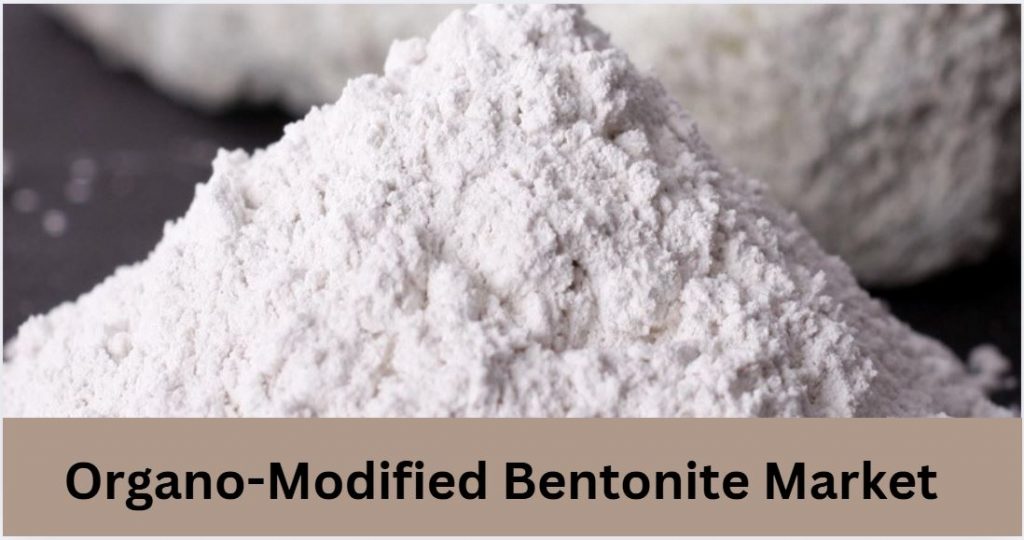
Market Overview
The organo-modified bentonite market is poised for steady growth, projected to expand from USD 283.8 million in 2024 to USD 469.68 million by 2032, reflecting a CAGR of 6.5% during the forecast period (2024-2032). The increasing demand across various industries, including oil & gas, paints & coatings, cosmetics, and water treatment, is fueling this expansion. With its superior rheological and adsorption properties, organo-modified bentonite is widely used as a thickening, suspending, and stabilizing agent in multiple applications.
The rising focus on eco-friendly and high-performance materials is driving manufacturers to develop innovative bentonite formulations. The growing exploration activities in the oil & gas sector and the demand for enhanced drilling fluids further strengthen market potential. Additionally, industries such as foundry, textiles, and cement are increasingly incorporating organo-modified bentonite to enhance product performance and quality.
As global industrialization accelerates, Asia-Pacific, North America, and Europe remain the dominant regions contributing to the market’s growth. Governments and industries are investing heavily in environmentally sustainable solutions, further propelling demand for organo-modified bentonite. With increasing R&D activities and technological advancements, the market is expected to witness new formulations and applications that cater to evolving industry requirements.
Download Sample Report: https://www.credenceresearch.com/report/organo-modified-bentonite-market
Market Drivers
Rising Demand in the Oil & Gas Industry
The oil & gas industry extensively utilizes organo-modified bentonite in drilling fluids to improve lubrication, suspension, and viscosity control. The expansion of offshore and onshore drilling activities worldwide, particularly in North America and the Middle East, has significantly increased the consumption of high-performance drilling additives. The U.S. shale boom and increased natural gas exploration in countries like Saudi Arabia, UAE, and China further drive demand. Additionally, advancements in horizontal drilling and hydraulic fracturing require specialized additives, further strengthening market prospects. With global energy demand rising, investments in deepwater and ultra-deepwater exploration are growing, ensuring a stable market for bentonite-based drilling fluids. The increasing emphasis on drilling efficiency and environmental compliance is also propelling the adoption of eco-friendly bentonite formulations.
Growing Adoption in Paints & Coatings
In the paints and coatings industry, organo-modified bentonite is used as a rheology modifier, ensuring enhanced viscosity control and anti-sagging properties. The booming construction and automotive sectors have led to increased demand for high-quality coatings, further boosting market growth. Urbanization and infrastructure development in emerging economies such as India, China, and Brazil contribute significantly to this demand. Additionally, the rise in eco-friendly and waterborne coatings has driven manufacturers to seek sustainable additives like organo-modified bentonite. The growing trend of smart coatings, which offer self-healing and anti-microbial properties, presents further growth opportunities for bentonite-based additives. Innovation in nanotechnology-enhanced coatings has also spurred interest in using advanced bentonite materials.
Expansion of the Cosmetics Industry
The personal care sector is witnessing rising demand for natural and mineral-based ingredients. Organo-modified bentonite is increasingly used in cosmetics as a stabilizer and thickening agent in products like lotions, creams, and makeup. The shift toward organic and clean-label beauty products is a significant market driver. Consumers are becoming more conscious of toxic-free, vegan, and sustainable cosmetics, prompting manufacturers to use bentonite as a natural alternative to synthetic stabilizers. Moreover, bentonite’s superior absorption and detoxification properties make it an essential ingredient in face masks and skincare formulations. The rise of men’s grooming and premium skincare products further supports market expansion. Increasing R&D in bio-compatible and multifunctional cosmetic ingredients also fuels demand.
Increased Use in Water Treatment Applications
Water treatment facilities are incorporating organo-modified bentonite for heavy metal adsorption and wastewater purification. With growing concerns over industrial pollution and water scarcity, the market for eco-friendly and efficient purification materials is expanding, contributing to sustained market growth. Industries dealing with oil spills, mining effluents, and chemical waste are adopting bentonite for its superior adsorption capabilities. Rising investments in desalination projects, especially in the Middle East & North Africa (MENA) region, create new opportunities. Additionally, bentonite-based filtration is gaining traction in municipal and industrial wastewater treatment plants. The introduction of biodegradable and reusable bentonite solutions is further boosting market demand.
Market Challenges
High Production Costs
The manufacturing process of organo-modified bentonite involves complex chemical modifications, leading to higher production costs. This factor may limit its adoption, especially among price-sensitive end users. The process requires specialized raw materials and energy-intensive refining, increasing operational expenses. Additionally, fluctuating raw material prices and supply chain disruptions can further elevate production costs. Many small and medium-sized manufacturers find it difficult to compete with larger players, leading to market consolidation and competitive pricing pressures. Companies investing in automation and process optimization are looking to reduce costs, but initial capital expenditures remain high. Furthermore, research and development (R&D) efforts for advanced formulations increase operational expenditures. The need for sustainable production methods further complicates cost structures, requiring compliance with evolving environmental standards.
Stringent Environmental Regulations
Regulatory frameworks concerning mining, processing, and chemical modifications of bentonite pose challenges to market growth. Governments and environmental agencies impose strict compliance requirements on mining activities to reduce ecological damage, increasing operational costs for manufacturers. The need for green and low-impact processing methods is compelling companies to invest in sustainable alternatives. Additionally, the presence of bans on certain chemical additives in coatings and cosmetics may impact formulations using modified bentonite. Manufacturers must obtain certifications and adhere to regional regulatory bodies such as REACH (Europe) and EPA (U.S.), which adds to operational complexities. As consumer preference shifts toward sustainable products, brands incorporating certified eco-friendly materials have a better market outlook. Despite these regulations, ongoing research into bio-based additives may provide alternative solutions, driving compliance-driven innovation.
Availability of Substitutes
Alternatives such as synthetic thickeners and polymers pose competition to organo-modified bentonite. Some industries prefer cost-effective substitutes, affecting overall demand. In paints & coatings, for example, acrylic-based rheology modifiers offer similar performance at a lower price. In cosmetics, silica-based stabilizers compete with bentonite-based solutions. Market penetration is also affected by innovations in nanomaterials that provide enhanced viscosity control. Additionally, the performance of substitutes in specific applications, such as adhesives and sealants, is improving, further challenging bentonite’s market position. Companies working on hybrid formulations integrating bentonite with other materials are looking to mitigate substitution risks. However, concerns over microplastics and petroleum-based additives in synthetic thickeners are pushing industries back toward natural alternatives like bentonite.
Supply Chain Disruptions
The reliance on raw material sourcing and geopolitical factors can impact supply chains. Disruptions due to mining restrictions, trade regulations, or logistics issues can lead to price fluctuations and market instability. The global COVID-19 pandemic exposed vulnerabilities in the supply chain, causing temporary shortages. Dependence on specific mining locations, such as the U.S., China, and Turkey, makes the market susceptible to regional instability. Transportation bottlenecks and labor shortages also contribute to periodic supply chain challenges. To mitigate risks, companies are exploring alternative sourcing strategies and investing in local production capabilities. Partnerships with logistics providers and digital supply chain solutions are becoming more common in ensuring smoother operations. Long-term contracts with raw material suppliers can provide cost stability, but they limit flexibility in case of market downturns.
Market Opportunities
Expansion into New Industrial Applications
The potential use of organo-modified bentonite in adhesives, sealants, and polymer-based materials offers new growth avenues. Innovations in nanotechnology-based bentonite formulations can further enhance its applications. Advanced nanoclay composites incorporating bentonite improve mechanical properties, opening new applications in automotive, aerospace, and 3D printing. The demand for high-performance materials with superior thermal stability and chemical resistance is driving R&D efforts in this segment. Organo-modified bentonite’s ability to enhance the durability of engineered materials makes it a valuable additive. Companies exploring custom-formulated solutions for niche industries stand to gain significant traction. Furthermore, as industries seek lightweight and high-strength materials, hybrid formulations with bentonite are gaining popularity.
Rising Demand in Sustainable Solutions
The increasing emphasis on eco-friendly and sustainable products creates a strong market for bio-based and natural alternatives. Research into biodegradable and renewable bentonite products presents lucrative opportunities. The push for sustainable coatings, packaging, and personal care products fuels demand for green additives. Manufacturers developing low-carbon footprint processing techniques are likely to gain a competitive edge. Increasing governmental support for sustainable industrial practices is expected to provide incentives for eco-friendly solutions. Innovations in waste reduction and recycling of bentonite-based materials are also gaining attention. The growing consumer demand for clean-label products in the beauty and personal care sector is accelerating market expansion. Companies focusing on eco-certifications and sustainability reporting will have a better competitive stance.
Growth in Emerging Markets
Rapid industrialization in Asia-Pacific, Latin America, and the Middle East is fueling demand. Investments in construction, oil & gas, and water treatment infrastructure are key growth drivers in these regions. Countries like India, Indonesia, and Brazil are witnessing an increase in foreign investments, boosting bentonite consumption. Government initiatives promoting wastewater management and sustainable energy further propel growth. The increasing presence of multinational manufacturers in these regions is enhancing supply chain efficiency and reducing costs. Expanding middle-class populations with rising purchasing power are contributing to greater demand for high-performance consumer products. Infrastructure modernization projects in Latin America and Southeast Asia present untapped opportunities for organo-modified bentonite applications.
Technological Advancements in Product Development
Advancements in surface modification techniques and hybrid bentonite materials are paving the way for innovative solutions. Companies focusing on high-performance, multifunctional additives are expected to gain a competitive edge. Smart additives with enhanced chemical resistance and self-healing properties are under research, providing next-gen solutions for multiple industries. The integration of artificial intelligence (AI) in material science is accelerating the development of precision-engineered bentonite-based products. 3D printing applications using bentonite-based composites are expanding beyond prototyping into large-scale industrial use. Digital modeling of rheological behavior is improving formulation efficiency and performance prediction.
Market Segmentation
By Application:
- Drilling Fluid
- Clarification Agent
- Nucleating Agent
- Binder
- Absorbent or Adsorbent
- Others
By End User:
- Oil and Gas
- Foundry
- Paints and Coatings
- Textile
- Water Treatment
- Cement
- Cosmetics
- Lubricants and Greases
- Coal Briquette
By Region:
North America
- U.S.
- Canada
- Mexico
Europe
- Germany
- France
- U.K.
- Italy
- Spain
- Rest of Europe
Asia-Pacific
- China
- Japan
- India
- South Korea
- Southeast Asia
- Rest of Asia-Pacific
Latin America
- Brazil
- Argentina
- Rest of Latin America
Middle East & Africa
- GCC Countries
- South Africa
- Rest of the Middle East and Africa
Regional Analysis
North America
The U.S. and Canada dominate the region due to high oil & gas exploration activities. The presence of major drilling fluid manufacturers strengthens demand. The shale gas boom in the U.S. and rising investments in renewable energy infrastructure further drive the market. Growing cosmetic and personal care industries in the region contribute to demand for natural stabilizers like bentonite. Increasing research initiatives in high-performance coatings and adhesives support market expansion. The rise of sustainable manufacturing practices in North America is positively influencing bentonite adoption.
Europe
Germany, France, and the U.K. are key markets, driven by advanced coatings, paints, and water treatment industries. Stringent environmental regulations are pushing companies toward eco-friendly alternatives, including bentonite-based solutions. Automotive sector growth in Germany and sustainable construction trends in France support the market. The European Green Deal and other regulatory initiatives favoring natural additives are expected to boost demand. A strong focus on recyclability and waste management is prompting companies to invest in alternative thickening and stabilizing agents.
Asia-Pacific
China, India, and Japan lead the market with rapid industrialization and growing demand in construction and cosmetics sectors. Expansion of manufacturing industries further accelerates growth. The rising middle-class population and increasing disposable income are driving demand for high-quality personal care products containing bentonite. Government initiatives for water conservation and industrial waste management present new growth opportunities. Increasing investments in domestic chemical production are reducing reliance on imports and stabilizing costs.
Latin America
Countries like Brazil and Argentina are investing in oil & gas exploration and sustainable water treatment solutions, driving demand for organo-modified bentonite. Infrastructure development and government-backed projects are additional growth catalysts. The expansion of agriculture-based industries and sustainable resource management initiatives is contributing to regional demand.
Middle East & Africa
The GCC region and South Africa are witnessing rising demand for drilling fluids in oil & gas and expanding water treatment projects. Growing construction and urbanization further boost market opportunities. The development of desalination plants and advanced wastewater treatment systems is enhancing the need for high-performance bentonite additives. Rising investments in oil refineries and petrochemical industries in the Middle East are further strengthening market potential.
Top Companies
- Elementis Plc
- Schlumberger Limited
- Laviosa Minerals Srl
- Lamberti S.p.A.
- ZHEJIANG HUATE GROUP
- Unitech Chemicals (Zibo) Ltd.
- Zhejiang Camp-Shinning New Material Co. Ltd.
- Manek Group
- Zhejiang Anji Tianlong Organic Bentonite Co. Ltd.
- Zhejiang Qinghong New Material Co. Ltd.
Future Outlook
- The organo-modified bentonite market will continue to expand, driven by demand in drilling fluids, paints & coatings, and cosmetics.
- Asia-Pacific and North America will dominate due to increasing industrial applications and oil & gas exploration.
- Companies will invest in R&D for eco-friendly formulations, enhancing sustainability in multiple industries.
- Water treatment applications will see significant growth due to rising concerns about water pollution and purification technologies.
- The automotive and construction industries will drive demand for high-performance coatings.
- New product development in adhesives and polymer composites will create additional opportunities.
- Increasing regulations will push manufacturers toward environmentally friendly production processes.
- Emerging markets in Latin America and the Middle East will provide expansion opportunities for key players.
- Technological advancements in nanotechnology-based bentonite modifications will further optimize its properties.
- Mergers and acquisitions will shape the competitive landscape, fostering innovation and market consolidation.
Download Sample Report: https://www.credenceresearch.com/report/organo-modified-bentonite-market


